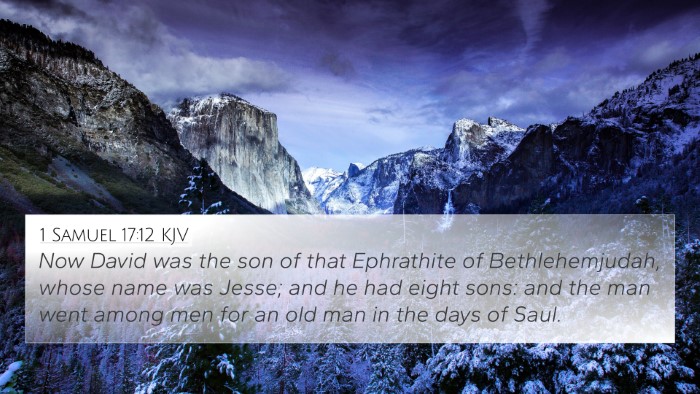Meaning and Interpretation of 1 Samuel 17:58
In 1 Samuel 17:58, we see a pivotal moment in the narrative of David's rise to prominence after defeating Goliath. This verse serves as a concise summary of the interchange between King Saul and David, marking an important connection in the biblical narrative.
Verse Text: "And Saul said to him, 'Whose son are you, young man?' So David answered, 'I am the son of your servant Jesse the Bethlehemite.'
Summary of Insights:
- David's Identity Revealed: This moment highlights David's humble beginnings and royal lineage through Jesse. Matthew Henry notes that despite David's monumental achievement, he humbly identifies himself; a reminder of the importance of humility even in success.
- The King’s Curiosity: Saul's question reflects a natural curiosity and concern about David's background. Albert Barnes emphasizes the significance of lineage in Israel's culture, suggesting that such questions also had political undertones, as Saul was looking to establish a relationship with a notable victor.
- The Role of Divine Providence: Adam Clarke points out that David's introduction to Saul underlines God's providential plan. David's victory was divinely sanctioned, and this recognition propels the unfolding of future events within Israel's history.
- Significance of Bethlehem: David's mention of Bethlehem foreshadows his future as king and ties into the broader biblical narrative concerning the lineage of Jesus Christ, who was also from Bethlehem, as per prophetic scriptures (Micah 5:2).
- A Prelude to Leadership: This is not only a moment of introduction but also a precursor to David’s future role as Saul’s armor-bearer and eventual king. It shows the beginnings of a relationship that will evolve—highlighting a theme of mentorship and transition in leadership.
- Focus on Humility and Service: David’s reference to Saul as his master indicates a posture of service. Matthew Henry notes that true leadership often emerges from humble service, setting an example for future leaders.
- Inter-Biblical Links: This verse creates connections to other scripture regarding lineage and God’s chosen leaders, echoing throughout biblical texts—such as Exodus 3:4 (God calling Moses), and the importance of who God chooses to lead His people.
Bible Cross-References:
- 1 Samuel 16:11 - David's anointing as king by Samuel.
- 1 Samuel 16:18 - Saul's servant speaking of David's skill and lineage.
- Psalm 78:70-72 - God choosing David from the sheepfold.
- Micah 5:2 - Prophesy of the Messiah being born in Bethlehem.
- Matthew 1:6 - Genealogy of Jesus, highlighting David's lineage.
- Acts 13:22 - Reference to David as a man after God's heart.
- 1 Chronicles 2:12 - Mention of Jesse as David's father.
Connecting Themes:
- Divine Choice: God’s selection of David mirrors the themes of divine choice and destiny, evident throughout scripture.
- Leadership Development: The development of David as a leader showcases the journey from obscurity to prominence.
- Importance of Heritage: The notion of heritage and family lineage is underscored in both the Old and New Testaments.
- Service to God: David’s statement also reminds readers of the importance of serving God and others rather than seeking personal glory.
Applications for Study:
- Understanding humility in leadership through David’s model.
- Exploring the significance of lineage in God's plan.
- Utilizing tools for Bible cross-referencing to uncover deeper connections between biblical texts.
- Examining how this verse fits into the wider narrative of David’s life and kingship.
Conclusion: In 1 Samuel 17:58, the simple exchange between Saul and David encapsulates profound truths about identity, divine providence, and the transitioning leadership in Israel. The cross-references with other biblical texts further illuminate the significance of this moment in relation to God's overarching narrative.




